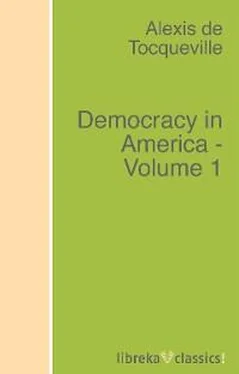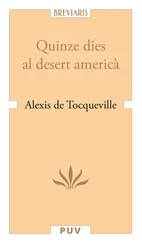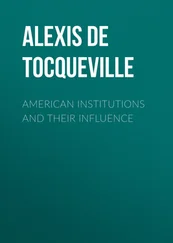Alexis de Tocqueville - Democracy in America - Volume 1
Здесь есть возможность читать онлайн «Alexis de Tocqueville - Democracy in America - Volume 1» — ознакомительный отрывок электронной книги совершенно бесплатно, а после прочтения отрывка купить полную версию. В некоторых случаях можно слушать аудио, скачать через торрент в формате fb2 и присутствует краткое содержание. Жанр: unrecognised, на английском языке. Описание произведения, (предисловие) а так же отзывы посетителей доступны на портале библиотеки ЛибКат.
- Название:Democracy in America - Volume 1
- Автор:
- Жанр:
- Год:неизвестен
- ISBN:нет данных
- Рейтинг книги:4 / 5. Голосов: 1
-
Избранное:Добавить в избранное
- Отзывы:
-
Ваша оценка:
- 80
- 1
- 2
- 3
- 4
- 5
Democracy in America - Volume 1: краткое содержание, описание и аннотация
Предлагаем к чтению аннотацию, описание, краткое содержание или предисловие (зависит от того, что написал сам автор книги «Democracy in America - Volume 1»). Если вы не нашли необходимую информацию о книге — напишите в комментариях, мы постараемся отыскать её.
libreka classics – These are classics of literary history, reissued and made available to a wide audience.
Immerse yourself in well-known and popular titles!
Democracy in America - Volume 1 — читать онлайн ознакомительный отрывок
Ниже представлен текст книги, разбитый по страницам. Система сохранения места последней прочитанной страницы, позволяет с удобством читать онлайн бесплатно книгу «Democracy in America - Volume 1», без необходимости каждый раз заново искать на чём Вы остановились. Поставьте закладку, и сможете в любой момент перейти на страницу, на которой закончили чтение.
Интервал:
Закладка:
l
[ Mather's "Magnalia Christi Americana," vol. ii. p. 13. This speech was made by Winthrop; he was accused of having committed arbitrary actions during his magistracy, but after having made the speech of which the above is a fragment, he was acquitted by acclamation, and from that time forwards he was always re-elected governor of the State. See Marshal, vol. i. p. 166.]
"Nor would I have you to mistake in the point of your own liberty. There is a liberty of a corrupt nature which is effected both by men and beasts to do what they list, and this liberty is inconsistent with authority, impatient of all restraint; by this liberty 'sumus omnes deteriores': 'tis the grand enemy of truth and peace, and all the ordinances of God are bent against it. But there is a civil, a moral, a federal liberty which is the proper end and object of authority; it is a liberty for that only which is just and good: for this liberty you are to stand with the hazard of your very lives and whatsoever crosses it is not authority, but a distemper thereof. This liberty is maintained in a way of subjection to authority; and the authority set over you will, in all administrations for your good, be quietly submitted unto by all but such as have a disposition to shake off the yoke and lose their true liberty, by their murmuring at the honor and power of authority."
The remarks I have made will suffice to display the character of Anglo-American civilization in its true light. It is the result (and this should be constantly present to the mind of two distinct elements), which in other places have been in frequent hostility, but which in America have been admirably incorporated and combined with one another. I allude to the spirit of Religion and the spirit of Liberty.
The settlers of New England were at the same time ardent sectarians and daring innovators. Narrow as the limits of some of their religious opinions were, they were entirely free from political prejudices. Hence arose two tendencies, distinct but not opposite, which are constantly discernible in the manners as well as in the laws of the country.
It might be imagined that men who sacrificed their friends, their family, and their native land to a religious conviction were absorbed in the pursuit of the intellectual advantages which they purchased at so dear a rate. The energy, however, with which they strove for the acquirement of wealth, moral enjoyment, and the comforts as well as liberties of the world, is scarcely inferior to that with which they devoted themselves to Heaven.
Political principles and all human laws and institutions were moulded and altered at their pleasure; the barriers of the society in which they were born were broken down before them; the old principles which had governed the world for ages were no more; a path without a turn and a field without an horizon were opened to the exploring and ardent curiosity of man: but at the limits of the political world he checks his researches, he discreetly lays aside the use of his most formidable faculties, he no longer consents to doubt or to innovate, but carefully abstaining from raising the curtain of the sanctuary, he yields with submissive respect to truths which he will not discuss. Thus, in the moral world everything is classed, adapted, decided, and foreseen; in the political world everything is agitated, uncertain, and disputed: in the one is a passive, though a voluntary, obedience; in the other an independence scornful of experience and jealous of authority.
These two tendencies, apparently so discrepant, are far from conflicting; they advance together, and mutually support each other. Religion perceives that civil liberty affords a noble exercise to the faculties of man, and that the political world is a field prepared by the Creator for the efforts of the intelligence. Contented with the freedom and the power which it enjoys in its own sphere, and with the place which it occupies, the empire of religion is never more surely established than when it reigns in the hearts of men unsupported by aught beside its native strength. Religion is no less the companion of liberty in all its battles and its triumphs; the cradle of its infancy, and the divine source of its claims. The safeguard of morality is religion, and morality is the best security of law and the surest pledge of freedom. *m
m
[ See Appendix, F.]
Reasons Of Certain Anomalies Which The Laws And Customs Of The Anglo-Americans Present
Remains of aristocratic institutions in the midst of a complete democracy—Why?—Distinction carefully to be drawn between what is of Puritanical and what is of English origin.
The reader is cautioned not to draw too general or too absolute an inference from what has been said. The social condition, the religion, and the manners of the first emigrants undoubtedly exercised an immense influence on the destiny of their new country. Nevertheless they were not in a situation to found a state of things solely dependent on themselves: no man can entirely shake off the influence of the past, and the settlers, intentionally or involuntarily, mingled habits and notions derived from their education and from the traditions of their country with those habits and notions which were exclusively their own. To form a judgment on the Anglo-Americans of the present day it is therefore necessary to distinguish what is of Puritanical and what is of English origin.
Laws and customs are frequently to be met with in the United States which contrast strongly with all that surrounds them. These laws seem to be drawn up in a spirit contrary to the prevailing tenor of the American legislation; and these customs are no less opposed to the tone of society. If the English colonies had been founded in an age of darkness, or if their origin was already lost in the lapse of years, the problem would be insoluble.
I shall quote a single example to illustrate what I advance. The civil and criminal procedure of the Americans has only two means of action—committal and bail. The first measure taken by the magistrate is to exact security from the defendant, or, in case of refusal, to incarcerate him: the ground of the accusation and the importance of the charges against him are then discussed. It is evident that a legislation of this kind is hostile to the poor man, and favorable only to the rich. The poor man has not always a security to produce, even in a civil cause; and if he is obliged to wait for justice in prison, he is speedily reduced to distress. The wealthy individual, on the contrary, always escapes imprisonment in civil causes; nay, more, he may readily elude the punishment which awaits him for a delinquency by breaking his bail. So that all the penalties of the law are, for him, reducible to fines. *n Nothing can be more aristocratic than this system of legislation. Yet in America it is the poor who make the law, and they usually reserve the greatest social advantages to themselves. The explanation of the phenomenon is to be found in England; the laws of which I speak are English, *o and the Americans have retained them, however repugnant they may be to the tenor of their legislation and the mass of their ideas. Next to its habits, the thing which a nation is least apt to change is its civil legislation. Civil laws are only familiarly known to legal men, whose direct interest it is to maintain them as they are, whether good or bad, simply because they themselves are conversant with them. The body of the nation is scarcely acquainted with them; it merely perceives their action in particular cases; but it has some difficulty in seizing their tendency, and obeys them without premeditation. I have quoted one instance where it would have been easy to adduce a great number of others. The surface of American society is, if I may use the expression, covered with a layer of democracy, from beneath which the old aristocratic colors sometimes peep.
Читать дальшеИнтервал:
Закладка:
Похожие книги на «Democracy in America - Volume 1»
Представляем Вашему вниманию похожие книги на «Democracy in America - Volume 1» списком для выбора. Мы отобрали схожую по названию и смыслу литературу в надежде предоставить читателям больше вариантов отыскать новые, интересные, ещё непрочитанные произведения.
Обсуждение, отзывы о книге «Democracy in America - Volume 1» и просто собственные мнения читателей. Оставьте ваши комментарии, напишите, что Вы думаете о произведении, его смысле или главных героях. Укажите что конкретно понравилось, а что нет, и почему Вы так считаете.












